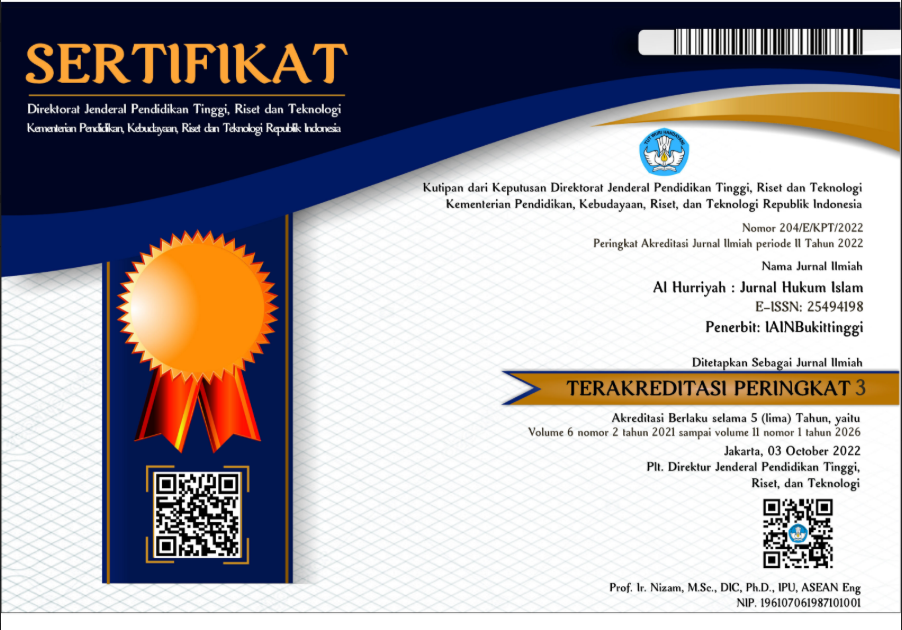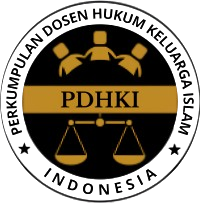Zakat for The Economy of the Ummah (Case Study in Sihapas Barumun Palas Sub-District, North Sumatra)
DOI:
https://doi.org/10.30983/al%20hurriyah.v8i2.6250Keywords:
Productive, Zakat, People's EconomyAbstract
References
Abdurrahman Al-Jazairi, Fiqh 'ala Madzahibul Arba'ah Juz I, Darul Ihya At-turats Al-'Araby cet : VII, Beirut, Libanon, 1986
Abdurrahman bin Nashir As-Sa'di, Taisir Karim Ar-Rahman fi Tafsir kalam Al-Manan, Jam'iyyah Ihya At-Turats Al-Islami, Kuwait, 2003
A.W. Munawwir, Kamus Al-Munawwir, Pustaka Progresif, Surabaya,
Anonimus, Pedoman Manajemen Zakat, jakarta, BAZISKAF PT Telekomunikasi Indonesia, 1996.
Anonimus, Kamus Besar Bahasa Indonesia, Balai Pustaka, Edisi III cet. II Jakarta, 2002
Anonimus, Holy Qur’an (Versi 6.50) / Program Kitab Suci Al-Qur’an, Perusahaan Software Sakhr / Perusahaan Al-Alamiah, Republik Arab Mesir. 1997
Al ghozali, “al mustasfa min ilm al ushul ,Juz 1â€( Bairut.daar al ihya’ al turats al ‘araby, 1997)
As-San’any, Subulus Salam Syarah Bulughul Maram, Juz II cet : I.
A.W. Munawwir, Kamus Al-Munawwir Arab – Indonesia, Pustaka Progresif, Surabaya, 1997
Didin Hafidhuddin, Zakat Dalam Perekonomian Modern. Cet. II. Gema Insani Press, Jakarta, 2002
Hasbi Ash-Shiddieqy, Pedoman Zakat, Bulan Bintang, Jakarta, 1987,
Masjfuk Zuhdi, Masail Fiqhiyyah, Penerbit PT. Gunung Agung Jakarta, cet. VII 1997
Muhammad bin Ali bin Muhammad Asy-Syaukany, Nailul AutharJuz III, Darul Kalam Ath-Thayib, Damaskus. 1999
Muhammad Abu Zahrah, Zakat Dalam Perspektif Sosial. Pustaka Firdaus, Jakarta,
Nuruddin bin mukhtar al khadimy. Al maqashid al istiqraiyah, haqiqatuha,hujjiyatuha,dhawabithuha
Nuruddin bin mukhtar al khadimy. Al maqashid al istiqraiyah, haqiqatuha,hujjiyatuha,wasailuha
Asy-Syaukani, Nailul AutharJuz III, Darul Kalam Ath-Thayib, Damaskus.tahun 1999
As-San'ani, Subulus Salam Syarah Bulughul Maram, Juz II cet : I. Jum’iyah Ihyau Turats Al-Islamy Kuwait
Downloads
Additional Files
Published
How to Cite
Issue
Section
Citation Check
License
Copyright (c) 2023 Pendi Hasibuan M.Ag

This work is licensed under a Creative Commons Attribution-ShareAlike 4.0 International License.
Authors who publish with this journal agree to the following terms:
- Authors retain copyright and grant the journal right of first publication with the work simultaneously licensed under a Creative Commons Attribution-ShareAlike 4.0 International License that allows others to share the work with an acknowledgment of the work's authorship and initial publication in this journal.
- Authors are able to enter into separate, additional contractual arrangements for the non-exclusive distribution of the journal's published version of the work (e.g., post it to an institutional repository or publish it in a book), with an acknowledgment of its initial publication in this journal.
- Authors are permitted and encouraged to post their work online (e.g., in institutional repositories or on their website) prior to and during the submission process, as it can lead to productive exchanges, as well as earlier and greater citation of published work (See The Effect of Open Access).





